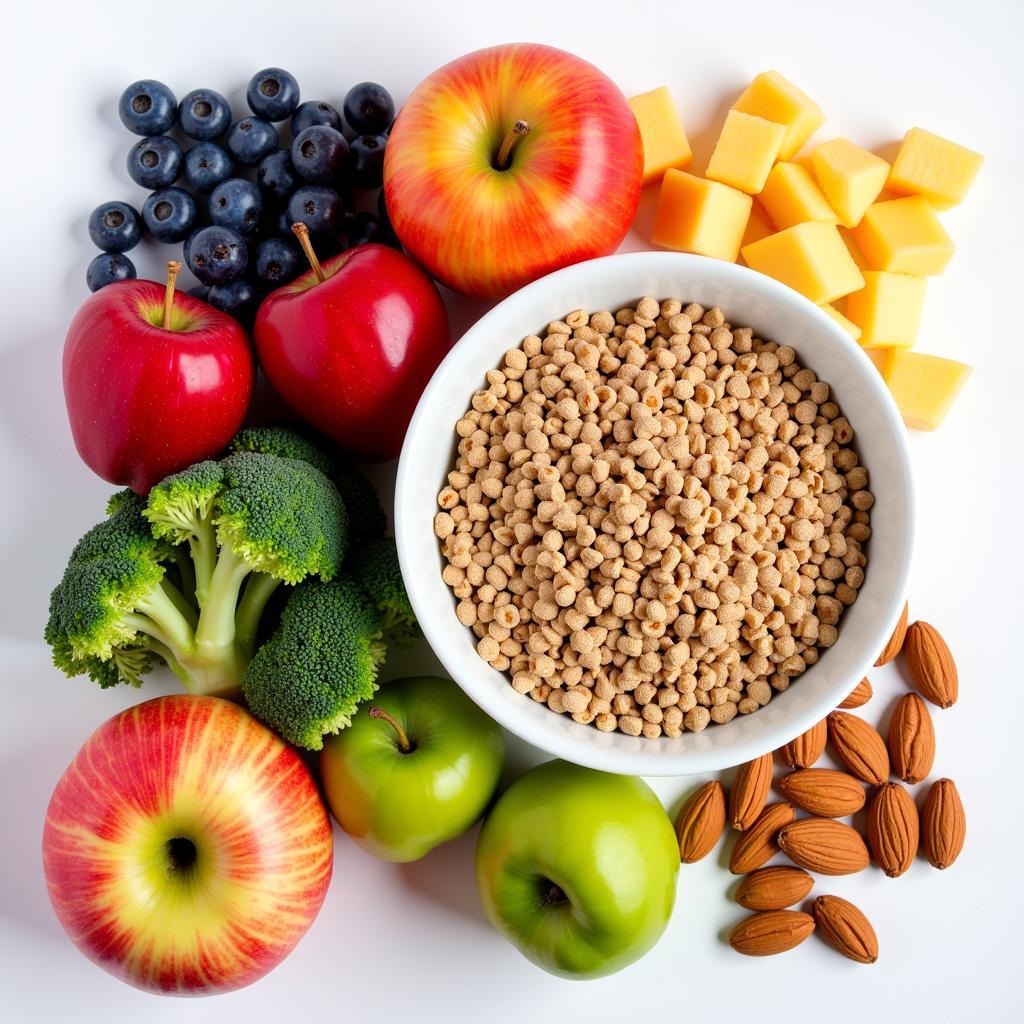The Ultimate Guide to African Grey Food
African Grey Food is a critical aspect of keeping these intelligent birds healthy and happy. Understanding their dietary needs ensures they thrive in captivity. This comprehensive guide dives into everything you need to know about feeding your African grey parrot, from formulating a balanced diet to recognizing harmful foods.
Understanding the African Grey’s Nutritional Needs
African greys, known for their exceptional intelligence and mimicking abilities, require a diet that’s as stimulating as their minds. In the wild, their diet is diverse, consisting primarily of fruits, seeds, nuts, and leafy greens. African grey food in the wild varies depending on the region and seasonal availability. Mimicking this variety in captivity is key to their well-being. A diet lacking in essential nutrients can lead to health issues like feather plucking, weakened immune systems, and even behavioral problems.
Building a Balanced African Grey Food Diet
So, what exactly constitutes a healthy african grey food diet? A balanced diet should include high-quality parrot pellets, which form the foundation of their nutrition. These pellets provide essential vitamins and minerals, ensuring a consistent source of necessary nutrients. Supplementing pellets with fresh fruits, vegetables, and healthy nuts is crucial for adding variety and stimulating their foraging instincts.
 A diverse spread of healthy food options for African Grey parrots, including pellets, fruits, vegetables, and nuts.
A diverse spread of healthy food options for African Grey parrots, including pellets, fruits, vegetables, and nuts.
What are some healthy food options for your African grey?
- Fruits: Apples, bananas, berries, oranges, and grapes.
- Vegetables: Broccoli, carrots, leafy greens (like spinach and kale), sweet potatoes, and bell peppers.
- Nuts: Almonds, walnuts, and pecans (in moderation).
Remember to always wash fruits and vegetables thoroughly before offering them to your parrot.
African Grey Foods to Avoid
Just as crucial as providing the right nutrients is avoiding harmful african grey foods to avoid. Certain foods can be toxic to African greys and should be strictly avoided.
What are some toxic foods for African greys?
- Avocado: Contains persin, which is toxic to birds.
- Chocolate: Contains theobromine, which can be fatal.
- Caffeine: Found in coffee, tea, and some sodas.
- Alcohol: Highly toxic and can cause liver damage.
- Onions and Garlic: Can cause anemia.
For a comprehensive list of african grey foods not to eat, consult with an avian veterinarian.
What do African grey parrots eat in the wild?
African grey parrots in the wild primarily consume fruits, seeds, nuts, and leafy greens available in their natural habitat.
How can I encourage my African grey to eat a variety of foods?
Offer new foods in small amounts alongside their favorite foods to encourage them to try new things. You can also try offering food in different ways, such as chopped, shredded, or whole. African grey food treats can be a great way to introduce new foods and provide mental stimulation.
Expert Insights on African Grey Nutrition
Dr. Ava Thompson, an avian veterinarian with over 20 years of experience, emphasizes the importance of a varied diet: “African greys are intelligent and curious creatures. Providing them with a diverse and stimulating diet is essential not only for their physical health but also for their mental well-being.” She further adds, “A balanced diet can prevent many common health problems and contribute to a longer, happier life for your feathered companion.” Another expert, Dr. Ben Carter, a renowned avian nutritionist, highlights the importance of proper portion control: “While variety is important, moderation is key. Overfeeding can lead to obesity and other health complications.”
In conclusion, providing a balanced [african grey food] diet requires careful consideration and understanding of their nutritional needs. By offering a variety of healthy foods and avoiding toxic ones, you can ensure your African grey lives a long, healthy, and enriching life.
FAQ
- What is the best food for an African grey parrot? A combination of high-quality pellets, fresh fruits, vegetables, and healthy nuts in moderation.
- Can African greys eat seeds? Yes, but seeds should be offered sparingly as part of a balanced diet, not as the main food source.
- How often should I feed my African grey? Provide fresh food daily and replenish pellets as needed.
- What are signs of malnutrition in African greys? Feather plucking, dull feathers, lethargy, and changes in droppings.
- Can I give my African grey table scraps? Avoid table scraps as they often contain unhealthy ingredients for parrots.
- How much should an African grey eat per day? Consult an avian veterinarian for specific recommendations based on your bird’s age, size, and activity level.
- How can I get my picky African grey to try new foods? Introduce new foods gradually and offer them alongside their favorite treats.
For further assistance, don’t hesitate to contact us: Phone: +255768904061, Email: kaka.mag@gmail.com or visit us at Mbarali DC Mawindi, Kangaga, Tanzania. We have a 24/7 customer support team available to help.



